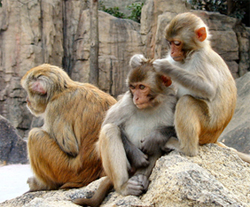Tuesday, 9 May 2017
Protect Your Immune System by Refusing To Be Dominated!

A study published in the November 25, 2016 issue of the journal Science shows that subordinate status in a social group seems to have harmful effects on an individual’s immune system. More specifically, this study found that a female rhesus monkey’s relative position in her group’s dominance hierarchy influenced the functioning of her immune system in the following way: the lower her rank, the fewer immune cells of a certain type her body produced.
And such differences seem to be caused by the activation or non-activation of certain genes. The study’s authors found that when they used experimental manipulations of the group to change individuals’ ranks in the hierarchy, the rate of expression of these genes changed as well.
For example, a monkey who dropped lower in the hierarchy activated more genes associated with inflammation. Inflammation is normal and is useful for fighting microbial infections. But when inflammatory mechanisms are activated in the absence of such infections (in this case, probably just by the stress inflicted by the dominant individuals), then they become harmful to the individual’s health.
Interestingly, those subordinate monkeys who received the most grooming from other monkeys were the ones with the lowest levels of inflammation, causing the study’s lead author, Noah Snyder-Mackler, to observe:
I think there’s a really positive social message. If we’re able to improve an individual’s environment and social standing, that should be rapidly reflected in their physiology and immune cell function.
This leads us, of course, to the concept of behavioural inhibition, developed by Henri Laborit, one of the fathers of neuropsychoimmunology, and vividly portrayed in the film Mon oncle d’Amérique (My American Uncle) by Alain Resnais. It also shows how being unable to express one’s full potential because of some form of dominance hierarchy can cause many pathologies, often by way of a weakened immune system.
![]() For Monkeys, Lower Status Affects Immune System
For Monkeys, Lower Status Affects Immune System
![]() Social status alters immune regulation and response to infection in macaques
Social status alters immune regulation and response to infection in macaques
Mental Disorders | Comments Closed







